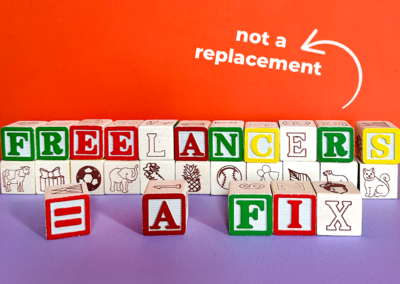At 7 years old, I had a very clear picture in my head of what my life would look like. After high school, I’d go off to college where I would decide on a career path based on my studies. Then, I’d apply for jobs in that field and get an offer to move to a big city for work. Slowly, I’d make my way up the ranks to becoming a professional. Eventually, once I saved up enough money, I’d probably move out to the suburbs and start a family.
Today, that vision—besides graduating from college in 2019—is completely scrambled. At 24 years old, I have lost almost all the clarity I had about my life back then. Rather, in taking a more “non-traditional” path, it seems I’ve chosen to sacrifice clarity about my future for other things that are better serving me right now in this current moment: things like flexibility, autonomy, and mission-alignment. And what I’m noticing now is that I’m far less alone on this path than I (or my college career counselors) thought I’d be.
While plenty of young people are still filtering for Fortune 500 companies on Glassdoor, I’ve started seeing a growing number of my peers (1-5 years post-grad) taking on a couple of different side jobs as opposed to one main job in hopes of sorting out what they actually want to do. Or, if they already have something they love, I’m seeing folks not wait as long to “follow their passions,” hustling on the side to make ends meet along the way.
In this article, I explore how the following factors are influencing and diversifying the early career decisions of today’s youngest professionals: urgent global demands, evolved social norms and individual belief systems, and technological innovation. I recognize that some of the choices or opportunities referenced might not apply to everyone, as we all have our own unique set of circumstances that shape our life paths—I had immense privilege going to college and also basing job decisions on factors besides just salary and benefits.
However, I hope to shine light on the diversity of possible job paths, demonstrate some of the greater social and environmental benefits of this diversification, and finally address some of the ways technology is democratizing access to these ever-evolving, world-changing opportunities.
Urgent Global and Social Demands
Between the warming planet, racial and economic inequalities, the Covid-19 pandemic, and the previous U.S. Presidential administration’s approach to just about everything, it feels like the world needs all the help it can get as fast as we can get to it. These circumstances are affecting young people’s decisions, as they enter the workforce, about the kind of work that feels pertinent and important to them.
One way to ensure you are contributing to solving one of these global challenges is to dedicate your career to it. Graduating in 2019, the year before what was probably the most important election year of our lifetime, I saw far more members of my university’s graduating class take jobs in public service or along a campaign trail than I’d seen in previous years.
“I was fundamentally opposed to the rhetoric and policies of the Trump administration and didn’t want to wake up the day after the election wishing I had done more,” Tanner Gildea, Harvard Class of 2019, says who moved to rural New Hampshire post-grad and joined Pete Buttigieg’s Presidential Campaign followed by a transition into a role as a Deputy Data Director for Joe Biden’s Campaign in Wisconsin.
Similarly, another fellow 2019 graduate Eloise Kaehny was working various part-time gigs around New York City until March 2020 when Covid-19 began shutting everything down. For Eloise, the pandemic and the devastation it was causing motivated her to become a civil servant for the city in the form of a Contact Tracer, a position she has held ever since.
Finally, the prevalence of natural disasters around the world and the urgency with which we are being called upon to act to save our planet are compelling many young folks to join the green economy—or at the very least factor in environmental impact when job hunting. Currently, I have three close friends working in climate or sustainability-related fields: one as a freelance journalist pitching her writing everywhere from small, climate-centered magazines to the New York Times; another friend works for a startup that creates everyday eco-friendly cleaning products without any plastic waste; and the last just moved to Kenya to head a clean energy non-profit organization.
The past few years have presented us with new challenges as well as a newfound sense of urgency for confronting old ones. I presume we will only continue to be tested and called to action in all kinds of ways, including in our workplace decisions. Gen Z—the most socially and environmentally conscious generation yet—likely won’t be waiting as long to get involved in impact-oriented work. I have a feeling younger folks will only continue to adopt a “no time like the present” sort of mindset.
Evolved Societal Norms and Individual Belief Systems
During the spring semester of my senior year at college, the most common question to ask or be asked by peers was, “So what are you doing next year?” Names like McKinsey, Goldman Sachs, Morgan Stanley, Bain, Kraft Heinz, and Walmart were tossed around—usually also followed by “in New York”—and invariably met with nods of approval or a celebratory cheers. It almost felt like people were taking jobs solely for that moment when someone would ask and they could reveal.
It was much harder (at the very least on the ego) to reply how I did, with “I’m not sure yet, and so I’m moving back in with my parents until I figure it out.” Again, a huge privilege to have that as an option. However, especially over this past year, the big company/big city combo has definitely lost some of its appeal most obviously due to Covid-19.
We have seen a huge rise in remote working, a de-stigmatization of living with parents, and a growing realization that FOMO (fear of missing out) is the driving factor behind many of our decisions. There are articles aplenty on the effects of Covid-19 on the future of work. However, what I am particularly fascinated by are the ways in which this pandemic has confronted younger people more than ever before with fundamental considerations about the whole of their lives.
More people seem to be questioning what they do, why, where, with whom, and asking themselves if their answers line up with their values as individuals. Whether as a direct result of pandemic devastation, last summer’s racial reckoning, or merely topics coming up in the news and on social media, consciousness is being raised about the damage that large corporations, government, or other societal structures do to humans and/or the environment. A few conversations I had with peers in the pre-pandemic world signaled to me that this disenchantment with some aspects of corporate America was a growing trend. Now, these feelings are only multiplying.
“My junior fall, the time when everyone is beginning the recruitment process for management consulting and banking/finance, I remember taking a class in the religion department about what makes an “authentic” life. Also, I had just read so much content about the kinds of structural harm that financial institutions are doing, so just from a more zoomed out, ethical perspective, I didn’t really want to involve myself in things like that… I didn’t want to sellout,” Eloise says.
At the same time, we have a semi-spiritual awakening taking place that has us all “manifesting” the lives of our dreams. Whether it’s my high school best friend who makes yearly vision boards and has manifested almost 2 million Tik Tok followers or my filmmaker friend Andrew who has made incredible sacrifices—like living out of his car—to pursue his career as a director, young people are able to chase their dreams with unique fervor and an ability to learn and adapt quickly. Hopefully, the successes of generations before will continue to inspire future generations to do the same.
“You can’t consider yourself a director if you’ve never directed. There are these intangible skills that you can read about and think about, but you can only actually acquire them yourself when you’re on set, writing and rewriting, and responding to different situations,” he says. “Now, I hold responsibility for my own career. It’s a very vulnerable position to be in but it’s also a very powerful position to be in because I can dictate where my career goes, how fast or slow it moves based on how much I put into it. And I like to work hard and I like to work a lot.”
Making a living by doing what you love is also how thought leaders have described this period known as the “Passion Economy.” The ability to monetize your passions through technology has, in a very practical way, changed the way we think about careers and career paths.
Technological Innovation
The Passion Economy refers to the millions of people monetizing on digital platforms—everything from Instagram photos, to Tik Tok dances, to podcasts, to newsletters, to Twitch streams, to digital art (NFTs). We do not have to look very far to see just how many “influencers” have risen to popularity across these platforms and for a variety of different skills and passions. These creators usually have a decent learning curve where they must teach themselves the unique set of skills necessary to “go viral” or steadily grow significant followings on one or more of these platforms. But once they hit a competitive number (relative to the platform), they are likely to start receiving messages from brands with sponsorship opportunities. Investor and thought leader Li Jin is one of the go-to sources for news and information about the exciting future of this industry.
If you don’t think your Tik Tok dancing would make the cut for a paid sponsorship, there are plenty of other services you might be able to offer—some ideas include copywriting or copyediting, social media management or public relations/media strategy, and lastly a great option is community management. These types of roles are most fulfilling when you are working on them for a values-aligned company, brand, or individual that you really believe in both fundamentally and in terms of future economic growth.
To this end, we cannot forget to include all of the technology we use for these roles which indirectly support us through providing us with resources, tools, and networks that make it possible to make a living in more creative ways. Many of my friends started by making their own websites, joining online Facebook groups for fellow freelancers (like Freelancing Females or Societygal), and telling their peer circles on LinkedIn, Twitter, or in-person that they were looking for work in case anyone knew someone looking to hire for their skillset.
We Are Rosie is a perfect example of a development under this economy as a platform that helps creatives and marketers monetize their business by facilitating the pairing of these freelancers with clients. Here, the monetization does not stem from fame but rather from efficient and effective matching based on the needs and skills of both sides.
Once you land a gig, your technological toolkit will be your greatest ally. Zoom is a semi-obvious example of a technology that has become so normalized in the workplace that it has rendered offices far less necessary and the physical location of employees practically irrelevant. I can only imagine video chatting (or its future iterations i.e. holograms) continuing to expand access and opportunities for folks, opening doors for more diverse applicant pools and giving folks already on the job greater flexibility.
Calendar-booking apps such as Calendly, task-organization apps such as Trello, and note-taking apps such as Notion are all extremely useful resources that make the day-to-day life of a freelancer much more manageable and efficient. Without an office space to hold yourself accountable, it might also be beneficial to look into co-working as these spaces are usually hubs of creative and innovative thinkers and events. The Croissant app is a great option for folks looking for a more affordable coworking subscription that lets you work around the world by the minute.
Getting paid to do what you love becomes less of a pipe dream and more a possible reality as you start to see so many people around you doing it. While everybody has their own set of circumstances and reasons shaping their paths, there appears to be a noticeable shift away from 9 to 5 corporate structures towards greater flexibility, autonomy, and mission-alignment. These changes seem to coincide with a sort of awakening happening in this country to how obsessive our culture has become with work and a concern about the social and environmental costs that these ethics and systems have on individuals and our world. Global demands are shifting, social norms and belief systems changing, and technology is democratizing access to a wider range of job “opportunities.” Pursuing a non-traditional path definitely takes hard work, sacrifice, dedication, and bravery. However, the rewards seem to be not only helping us take better care of ourselves but also pushing us in the direction of greater opportunities and a more positive impact on the world.
Val’s Socials: LinkedIn, Twitter, Instagram
Editor’s Socials – Jessie Kernan: LinkedIn, Twitter, Instagram



